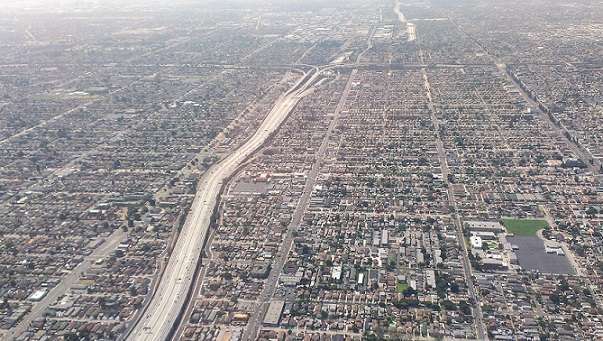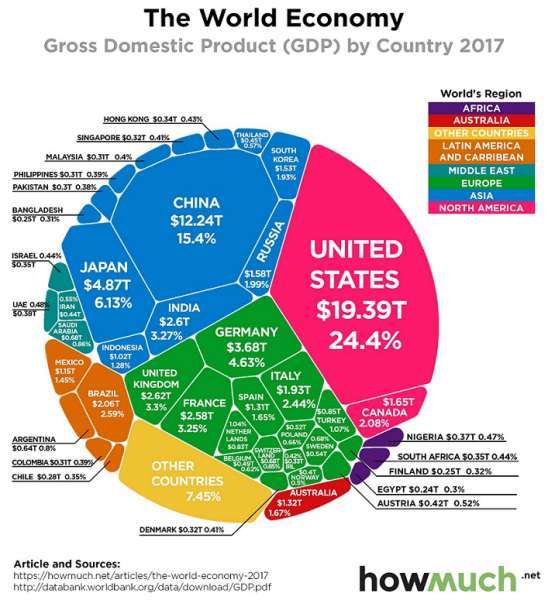你如何预测2019年的中国经济? [美国媒体]
quora网友:中国经济会继续放缓。各种形式的基础设施和其他大型项目都存在大量的建设过度现象。中国的债务和国内生产总值(GDP)之比正迅速攀升到275%.....
What are your predictions for China's economy in 2019?
你如何预测2019年的中国经济?
-------------------1-------------------
Anthony Philip Segadelli
It will continue to slow. There is massive overproduction of all forms of infrastructure and other large projects. The Chinese debt to GDP is fast heading to 275%
https://www.bloomberg.com/news/a ... bloomberg-economics Sizing Up China’s Debt Bubble: Bloomberg Economics.
This level of debt is unsustainable and will lead to a situation similar to Japan a few decades ago.
中国经济会继续放缓。各种形式的基础设施和其他大型项目都存在大量的建设过度现象。中国的债务和国内生产总值(GDP)之比正迅速攀升到275%:
https://www.bloomberg.com/news/a ... bloomberg-economics 《彭博经济:评估中国的债务泡沫》
这样的债务水平是无法持续的,并将最终导致类似于几十年前日本的状况。
Furthermore the population is ageing and wages have increased dramatically
http://www.chinadaily.com.cn/a/2 ... 10eff30328c1e5.html New report suggests China's contribution to global wage growth
which is making the lower end, high wage employing sectors less competitive.
Basically the economy will slow down and unrest will speed up. The big worry is if this is used as an excuse for being more aggressive towards its neighbours.
此外,人口老龄化、工资大幅增长也会造成问题:
http://www.chinadaily.com.cn/a/2 ... 10eff30328c1e5.html 《最新报告显示中国对全球工资增长的贡献》
这将造成低端高工资的就业部门竞争力下降。
总体上,经济将继续放缓,动荡将会加剧。而最令人担心的是,这是否会被用作对邻国采取更具侵略性行动的借口。
-------------------2-------------------
Clément Renaud
The difficulty to predict what is going to happen in 2019 in China shows that we have entered very uncertain times.
The economic outlook of the coming year depends on how political tensions will resolve, both internally and globally.
The national Chinese economy itself has some problems but they are reasonably under control. Chinese people are working hard. The strategic industrial planning looks good. Businesses still flourish, even if many of the craziest opportunities are beyond already.
很难预测2019年的中国会怎么样,这恰恰说明我们已进入了一个充满不确定性的时期。
中国未来一年的经济前景将取决于国内和全球政治紧张局势将如何演进。
中国国民经济本身也存在一些问题,但仍处于合理可控范围之内。中国人正在努力解决这些问题,战略层面的产业规划看起来也不错。虽然很多最疯狂极端的商业机会已经不复存在,但企业仍然能蓬勃发展。
The relationships with the US is of course one of the most decisive factor. This has been framed as a “trade war” but it looks much more like a classical political conflict. Xi and Trump are playing the nationalism card to cover up for internal issues.
Still, I am amazed that, after thousands of years, we humans have not been capable to figure out better ways to rule the planet than what currently exist.
当然,中美关系将是决定性因素之一。这场“贸易战”看起来更像是一场经典的政治斗争。中美都在玩弄民族主义以掩盖各自的内部问题。
老实说我还是很惊讶,经过了几千年,我们人类竟然还是没能找到比目前这种方式更好的办法来治理这个世界。
-------------------3-------------------
Zee Li
I’m a PRC citizen. In 2019 it will have some difficulties and will still be able to manage a growth of 6.3% - 6.5%. Chinese economy is going to be very good in long term,.
China already consume more than USA, you need to look at “Total Retail Sales of Consumer Goods”, which is what matters than the total consumption. Even with western media's "slowing down", the number still grows at 9.2% in 2018. USA have a larger overall consumption is because services like college tuition, eg, top universities in China cost you $1000, but US top universities cost you $50,000 every year, along with medical, lawyer. But in terms of goods in trade. China is already more important than USA for other countries because it is a larger market. and China's export to USA is only 10% of its domestic consumption. According to calculation, if USA tariff all the 500 billion goods, that will only bring down GDP growth by 1%. China will still have around 6% gdp growth rates.
我是中国公民。2019年,中国经济会面临一些困难,但仍能实现6.3%-6.5%的增长。从长远来看,中国经济仍会非常出色。
中国在消费上已经超过了美国——你应该看的是“消费品零售总额”这个数据,它比消费总额更重要。即使在西方媒体的一片“放缓”声中,2018年中国的这一数据仍然增长了9.2%。美国的总消费量更大,是因为像大学学费这类支出。比如,中国顶尖大学的学费是1000美元,而美国顶尖大学每年的学费是5万美元;还有医疗、律师等费用。但就货物贸易而言,中国对其他国家已经比美国更重要,因为她已经是一个更大的市场了。根据计算,如果美国对5千亿美元的中国商品加征关税,只会使中国的GDP增速下降1%。中国仍能保持6%左右的增长。
I’ve seen people using night-lights maps to demonstrate Chinese GDP is fake. Take a look at Shanghai https://res.klook.com/images/fl_...
take a look at LA: https://upload.wikimedia.org/wik...[url=https://www.ef.com/sitecore/__~/...]https://www.ef.com/sitecore/__~/...[/url]
Of course LA would have larger lighting area looking from outer space because it is so much more flat out.
Western media has been predicting the collapse of Chinese economy for 20 years, but they failed everytime, this time I will cast my doubt on them again. Why the West is mostly wrong about China's economy, they keep applying economic models to China as if it behaves like the West, not realising China is very very different to the West and the same economic models that can predict the American economy may not apply to the Chinese one.
我见过有人用夜晚灯光图来证明中国的GDP是假的。看看上海:
再看看洛杉矶:
瞧,洛杉矶如此平坦,从外层空间拍下来,它当然会有更大的照明区域。
西方媒体20年来一直在预测中国经济即将崩溃,但从没说对过。这次我仍然不会相信他们。为什么西方总是在中国经济问题上出错?因为他们一直把西方经济模型套用在中国身上,根本没有意识到中国与西方国家是如此不同,能用来预测美国经济的模型,对中国可能就不适用。
If you still think all the statistics from China is fake then I have no way to argue. Numbers can be fake, but influence is real. China is investing hundreds of billions of dollars abroad, China is building battle ships faster than USA, where does all those money come from? Chinese brands phone combined has larger global market share than Apple and Samsung combined. China already has more unicorn companies than USA. Are those numbers real or not? In fact I agree GDP number is not as important as people think it might be to assess the economic power of country because the calculation method can vary(eg, China doesn’t count house rent in GDP like USA, doesn’t count prostitution earnings in GDP like UK). the influence one can feel maybe more objective.
如果你还是认为来自中国的所有统计数字都是假的,那我也不知道说什么好了。数字可以造假,但结果造不了假。中国正以数千亿美元投资海外,她建造战舰的速度超过了美国,这些钱从哪儿来的?中国品牌手机合起来占有的全球市场份额已经超过了苹果、三星之和。中国的独角兽公司数量已经多过美国。这些数字是真是假?其实,我也同意GDP数字并不像人们以为的那样重要,各国连计算方法都各不相同(比如,中国不像美国那样把房屋租金计入GDP,也不像英国那样把色情行业收入计入GDP)。人们生活中能感受到的影响可能更客观真实。
In terms of debt. you know how Chinese government handle debt? they can just secretly waive it. One example is Bohai Steel group co. ltd. After the bankruptcy and restructuring of state-owned enterprise, those debt just disappeared. Since 96% of the Chinese debt are owed to Chinese state banks, the government has so many tools and ways to avoid any “collapse”.
关于债务问题。你们知道中国是如何处理债务的吗?他们可以默默地把它一笔勾销。渤海钢铁集团就是一个例子,在国有企业破产重组后,这些债务就消失了。由于中国96%的债务都是欠中国国有银行的,中国有很多工具和手段来避免“崩溃”。
From the perspective of industrial upgrade progress, China is steadily climbing up on the value chain: I suggest people interested in Made in China 2025 go to this page and do a google translation: https://zhuanlan.zhihu.com/p/541... these are the progress China has been made in the year 2018 and can be observed with naked eye. For example, the largest part in IC industry is memory chip, YMTC in Nand flash field and Changxin in DRAM field are both expected to start massive production in 2019. Example like this are numerous. more and more enterprises are making more profit because of the improvement of technology and wages of employees of those enterprises are rapidly increasing. And then they will spend more money on consumption Share of consumption in GDP growth rises to 78%
从产业升级进程来看,中国正在价值链上稳步攀升:我建议对“中国制造2025”感兴趣的朋友用谷歌翻译来查看以下网页:https://zhunlan.zhihu.com/p/541…(链接的是知乎文章《2018年中国制造高端化进展总结》,作者宁南山)这些都是中国在2018年取得的进展,肉眼可见的进展。例如,半导体行业中最大一块的存储器芯片,长江存储(YMTC)的NAND闪存、合肥长鑫的DRAM,都有望在2019年实现量产。这样的例子不胜枚举。随着技术进步,越来越多企业利润率会逐步提高,这些企业员工的工资也会快速增长,也就会花更多钱来消费。消费在中国GDP增长中所占的比重已经上升到了78%。
-------------------4-------------------
Paul Denlinger
What the biggest problems for the Chinese economy at the moment are:
·Excess production capacity: the Chinese government hoped that the BRI (Belt and Road Initiative) would take up some of this capacity, but this project has come under fire from non-Chinese in 2018, so that it is unlikely to accept this excess capacity. Chinese SOEs will have to adjust to this new reality.
·The Chinese private sector does not trust the Chinese government. The Chinese private sector has been responsible for most of China’s growth over the past 30 years, but given a chance, most private Chinese business owners prefer to leave China.
·The US tariffs have hit the Chinese economy very hard, starting with Chinese equity markets. Many manufacturers are complaining that their orders are drying up.
·Internal reforms in the Chinese Communist Party are happening too slowly. For the past 40 years, the emphasis has been on increasing production capacity and on real estate value growth. There is too much production capacity, and real estate values have largely plateaued; so what is going to replace them? Nobody seems to have any ideas.
中国经济目前面临的最大问题包括
· 产能过剩:中国希望通过一带一路(BRI)消化一部分过剩产能,但该倡议在2018年遭到了来自中国以外的广泛质疑,所以短期内这一目标不太可能达成。中国国有企业将不得不适应这个新的现实。
· 中国私营部门不信任中国。过去30年,私营部门一直是中国经济增长的主要推动者,但如果有机会的话,大多数中国私营企业主更愿意离开中国。
· 美国的关税战对中国经济的冲击非常大,这从中国股市表现就可见一斑。很多制造商都在抱怨他们的订单正在枯竭。
· CCP的内部改革进行得太慢。过去40年,重点一直是提高生产力和让房地产增值。现在则是生产能力太过庞大,房地产价格也基本上涨不动了;那么,用什么来取代它们?似乎没有人有任何办法。
Two years ago, the Chinese government bet on the BRI as part of China’s next stage of growth, but outside China, in countries like Pakistan and Malaysia, it is much less popular. But the Chinese government had no Plan B.
Also, the Trump administration has identified China as a bad player internationally, and this seems like one of the issues which Republicans and Democrats can agree on. The Chinese government got too comfortable under previous US administrations, and assumed that the US would just peacefully move aside and let China become the leader. How naive!
This has put the Chinese government very much on the defensive in 2018, and it is not quite sure how to react.
In 2018, just about everything which could go wrong did go wrong for China.
两年前,中国把下一阶段增长的宝押在一带一路倡议之上,但在中国之外,包括在像巴基斯坦和马来西亚这样的地方,一带一路的受欢迎程度要低得多。但中国好像没有B计划。
此外,特朗普政府已经认定中国在国际上是一个糟糕的参与者,在这一点上似乎共和民主两党也少有地达成了共识。中国在前几届美国政府时期过得太安逸,以至于以为美国会默默让位,让中国成为新的领袖。多么天真!
这使得中国在2018年基本处于守势,也不太确定如何应对新局面。过去这一年,几乎所有可能对中国不利的事情都发生了。
-------------------5-------------------
Robin Daverman
Look, if you are a bunny, and people ask, what do you expect in the new year, you may say, “well, I could be eaten by a fox, or a wolf, or an eagle, or a mountain lion, or an owl, or a snake … but if I survive all that in the new year, I can become a big fat bunny with ten baby bunnies!” OK. That’s sounds reasonable.
If you are an elephant, and people ask, what do you expect in the new year, you go, “well, I could be eaten by a fox, or a wolf, or an eagle, or …” People will look at you with their jaws dropped, and an “are you f*cking kidding me” - look on their faces.
你瞧,如果你是只兔子,人们问你对新年有什么期待时,你可能会说:“嗯,我可能会被狐狸、狼、鹰、美洲狮、猫头鹰或者蛇吃掉……但如果新的一年里我能活下来,我希望可以变成一只大肥兔子,生上十来只小兔子!”很好,这听起来很合理。
但如果你是一头大象,当别人询问你新年愿望时,你要是也说:“嗯,我可能会被狐狸、狼、鹰……”大家只会一脸错愕地盯着你,问:“你是在开玩笑吧?”
Elephants are not bunnies. “External enemies” are not the key issues for them. Good self management is the key. Countries like China and the US are elephants, not bunnies. Thus for both countries, their economy this year is very much dependent on their own domestic policies. This should be the baseline understanding for both countries (which is why President Trump’s endless ‘countries A,B, C. D, E, F, G,… are keeping us down’-talking points are mostly baseless distractions).
大象和兔子不一样,“外敌”并不是他们第一关心的问题,良好的自我管理更关键。中国和美国这样的国家就是大象,不是兔子。因此,两国今年的经济表现在很大程度上将取决于他们各自的国内政策。这应该成为我们分析这两个国家时的一个基本共识(这也是为什么特朗普总统那些“A国、B国、C国、D国、E国……正在阻碍/拖累我们美国”的没完没了的说法,基本上都只是在毫无根据地转移视线。)
But there the similarity ends. While the US economy is similar to the African Safari, the Chinese economy is more similar to a manicured farm. The US can only directly affects the economy with the Fed’s interest rate adjustment (which is like, do you want rain or drought? Pick one ’cause that all what I can do for you), so you, as an investor, need to worry about the potential for drought, flood, tornado, and avalanche. In China, that’s the Chinese government’s job to make sure those things are managed, which is why China started forcing companies to de-leverage for the past two years, forcing housing prices to stabilize, and control the exchange rate to keep other people’s troubles out. Inducing local avalanches to lower the risks of big, unplanned avalanches. China can say, I want industries 1 - 3 to reduce their outputs by 10%, and I want industries 4 - 10 to increase their outputs by 5 - 15%, and I want 2 new industry on so-and-so by the end of this year.
但是,两国的相似之处也就仅此而已了。美国经济如同一个非洲野生动物园,而中国经济更像是一座修剪齐整的农场。美国只能通过美联储的利率调整来直接影响经济运行(这就好比问你,想要下雨还是不下雨?只能选一个,因为这就是政府所能提供的一切),于是作为一名投资者,你需要自己去担心干旱、洪水、龙卷风、雪崩等等可能出现的问题。但在中国,部门的工作恰恰是确保以上各种情况得到有效管理,这就是为什么中国在过去这两年开始强迫企业去杠杆化,迫使房价趋于稳定,并控制汇率以避免其他国家出现的问题传导到中国。诱发局部雪崩以降低更大的、计划外突发雪崩的风险。中国可以说,我希望工业部门1~3的产出减少10%,而让工业部门4~10的产出增加5%~15%,我还希望在今年年底前新增2个工业部门……
So predicting the US economy is like predicting the weather. Predicting the Chinese economy is like predicting a construction project. They are, let’s just say, a bit different.
Which means that predicting the Chinese economy is actually quite a bit easier, if you assume that the Chinese government has a competent engineering team. You just need to pull out China’s current Five-year plans of China as the blueprint, figure out where the current base is, then look up on the goals and targets. The Plan for 2016 - 2020 includes 24 goals and 13 binding targets. 6.5% average GDP growth target. These will be done. The only uncertainty is the exact timing. In fact, the US government keeps a close eye on China’s five-year-plans. Here is the one with the latest update, posted on the US Government’s site:
https://www.uscc.gov/sites/defau ... _2.14.17_Updated%20(002).pdf
所以,预测美国经济就像预测天气;预测中国经济则像预测一个建筑工程。你瞧,它们的确有点不一样。
这还意味着,如果你确信中国拥有一支称职的设计规划团队,那么预测中国经济实际上要容易得多。你只需以中国现行的五年计划为蓝图,搞清楚当前的基准点在哪里,然后找到蓝图里设定的任务和目标即可。2016年~2020年的五年计划,包括24项发展指标和13个有约束力的目标。其中GDP的平均增速目标是6.5%,这就足够了,唯一不能确定的就是准确的时间安排。其实,美国政府也在密切关注中国的五年计划。下面就是美国政府网站上发布的介绍中国最新版五年计划的文件:
https://www.uscc.gov/sites/defau ... _2.14.17_Updated%20(002).pdf
(链接给出的是美国“美中经济安全审查委员会”(USCC)17年发布的详细介绍十三五计划PDF文件)
Figuring out the current base is a bit tricky, because this year is the year of China’s Economic Census. China conducts economic census once every 5 years. After the previous 3 economic census in 2004, 2008, and 2013, China revised her GDP up by 16.8%, 4.4%, and 3.4%, respectively. (Surprise! When people aren’t looking, China revises her GDP up! Who’d have thought!)
https://www.nytimes.com/2014/12/ ... larger-in-2013.html
China G.D.P. Is Revised 3.4% Higher For Last Year
弄清楚当前的基准倒是有点棘手,因为今年(2019)将是中国进行全国经济普查的一年。中国大约每5年做一次全国经济普查。在2004年、2008年和2013年进行的前三次普查之后,中国分别把GDP向上修正了16.8%、4.4%和3.4%(意外吧!就在大家都没有注意的时候,中国上调了她的GDP数据!谁能想到呢!):
https://www.nytimes.com/2014/12/ ... larger-in-2013.html
(链接是2014年《纽约时报》报道中国经济普查后将GDP上修3.4%)
China just closed the last fiscal year on Dec. 31, 2018, and officially kicked off this new round of economic census. Given past history, the GDP will almost certainly be revised up, again.
As for the global economic uncertainty - China is the biggest trade partner to 124 countries, has 100+ bi-lateral trade agreements, 16 FTAs, 70 countries with combined 4 billion population directly involved in the Belt and Road Initiative. This is the foundation of China’s global trade network. Do you have enough money to bribe 4 billion people off? No? Well then. Once you become an elephant, even an eagle is just an occasional annoyance.
中国刚刚于2018年12月31日结束了上一个财政年度,并正式启动了新一轮的经济普查(注:2019年1月1日零时,第四次全国经济普查现场登记工作正式启动)。考虑到过去的历史,GDP规模几乎肯定会再次上修。
至于全球经济方面的不确定性——中国目前是124个国家的最大贸易伙伴,签署了超过100个双边贸易协定,16个自由贸易协定;有70个国家的40亿个人口直接参与到“一带一路”倡议当中。这,就是中国全球贸易网的基石。
除非你有足够的钱来贿赂这40亿人(让他们反对和中国贸易)?没有?那好吧。一旦你成为了一头大象,头上盘旋的鹰也不过只是偶尔的烦恼。
-------------------6-------------------
Charlie Li
Unlike all the other answers provided at the moment, I will give a direct statement: China’s economy will slow down, for better and for worse.
Global recession. There is much concern that a huge recession might take place soon. The inevitable boom bust cycle is coming, but no one knows when the last straw will happen.
Better environmental regulations. I’m in Beijing right now and in official channels the statement is: “ Gold mountain, silver mountain, nothing is better than Green mountains.” Knowing the ability of the Chinese government to take action when it wants to, I’m sure the environment will improve. However, the downside is high pollution industries, which used to be a big part of Chinese economy, will be shut down. Maybe this is a net positive for the economy in the long run, as environment doesn’t factor into GDP but is very important.
和其它答案不同,我将给出一个直截了当的判断——中国经济将会放缓,不管是发生以下哪种情况:
全球大衰退:人们非常担心,一场巨大的经济衰退可能随时会发生。不可避免的景气-萧条周期会继续,只是没人知道(导致萧条的)最后一根稻草何时才会落下。
更严格的环保法规:我现在就在北京,这里的官方说法是:“金山银山,不如绿水青山。”我相信环境会持续改善,因为我知道中国有能力在必要的时候采取行动。然而,不利的一面是,高污染产业过去一直是中国经济的重要组成部分,现在却面临关停。从长远看,这对经济反而可能是净利多,因为环境问题虽然不直接影响GDP,但它的重要性不言而喻。
Global rise of nationalism. This is not a reason but a catalyst. Nationalism rises due to poor economy and nationalism prevents rational action, which leads to poorer economy. We can see this happen world wide.
Failed investments overseas. I’m not very confident about the infrastructure projects overseas. I could see them failing, either on their own or due to outside influence by other countries.
I’m going to risk it and put my opinions here. No one can predict the future and I’ve tried my best. Everything I said may prove to be wrong as time passes.
全球民族主义的兴起:这个不是原因,而是催化剂。经济不景气导致民族主义抬头,而民族主义又阻碍理性的行为,导致经济进一步不景气。我们可以看到这重状况正在世界范围内发生。
海外投资失败:我对(中国)在海外进行的基础设施项目不是很有信心。我可以预见他们可能的失败,要么是因为自身问题,要么是由于其他国家制造的外部干扰。
我冒险把我的意见摆在这里。没人真能预测未来,我尽力了。时间,可能会证明我说的每一条都是错的。
-------------------7-------------------
Randall Burns
Some folks are going to claim there is a “slow down”. What I think is more accurate: China will diversify its economy so it has stronger export positions outside the US/EU. China will also make substantial infrastructure investments outside China. China’s major robotics initiative will plug away.
有些人说(中国经济)会经历一个“放缓/减速”过程。我认为更准确的说法是:中国将使其经济进一步多样化,从而在美国/欧盟以外的市场上争取更强的出口地位。中国还将在境外继续进行大量的基础设施投资。中国重点推动的机器人技术也将坚持做下去。
版权声明
我们致力于传递世界各地老百姓最真实、最直接、最详尽的对中国的看法
【版权与免责声明】如发现内容存在版权问题,烦请提供相关信息发邮件,
我们将及时沟通与处理。本站内容除非来源注明五毛网,否则均为网友转载,涉及言论、版权与本站无关。
本文仅代表作者观点,不代表本站立场。
本文来自网络,如有侵权及时联系本网站。
图文文章RECOMMEND
热门文章HOT NEWS
-
1
Why do most people who have a positive view of China have been to ...
- 2
- 3
- 4
- 5
- 6
- 7
- 8
- 9
- 10
推荐文章HOT NEWS
-
1
Why do most people who have a positive view of China have been to ...
- 2
- 3
- 4
- 5
- 6
- 7
- 8
- 9
- 10










